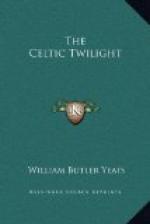[FN#5] The religious society she had belonged to.
Her thoughts and her sights of the people of faery are pleasant and beautiful too, and I have never heard her call them the Fallen Angels. They are people like ourselves, only better-looking, and many and many a time she has gone to the window to watch them drive their waggons through the sky, waggon behind waggon in long line, or to the door to hear them singing and dancing in the Forth. They sing chiefly, it seems, a song called “The Distant Waterfall,” and though they once knocked her down she never thinks badly of them. She saw them most easily when she was in service in King’s County, and one morning a little while ago she said to me, “Last night I was waiting up for the master and it was a quarter-past eleven. I heard a bang right down on the table. ‘King’s County all over,’ says I, and I laughed till I was near dead. It was a warning I was staying too long. They wanted the place to themselves.” I told her once of somebody who saw a faery and fainted, and she said, “It could not have been a faery, but some bad thing, nobody could faint at a faery. It was a demon. I was not afraid when they near put me, and the bed under me, out through the roof. I wasn’t afraid either when you were at some work and I heard a thing coming flop-flop up the stairs like an eel, and squealing. It went to all the doors. It could not get in where I was. I would have sent it through the universe like a flash of fire. There was a man in my place, a tearing fellow, and he put one of them down. He went out to meet it on the road, but he must have been told the words. But the faeries are the best neighbours. If you do good to them they will do good to you, but they don’t like you to be on their path.” Another time she said to me, “They are always good to the poor.”




